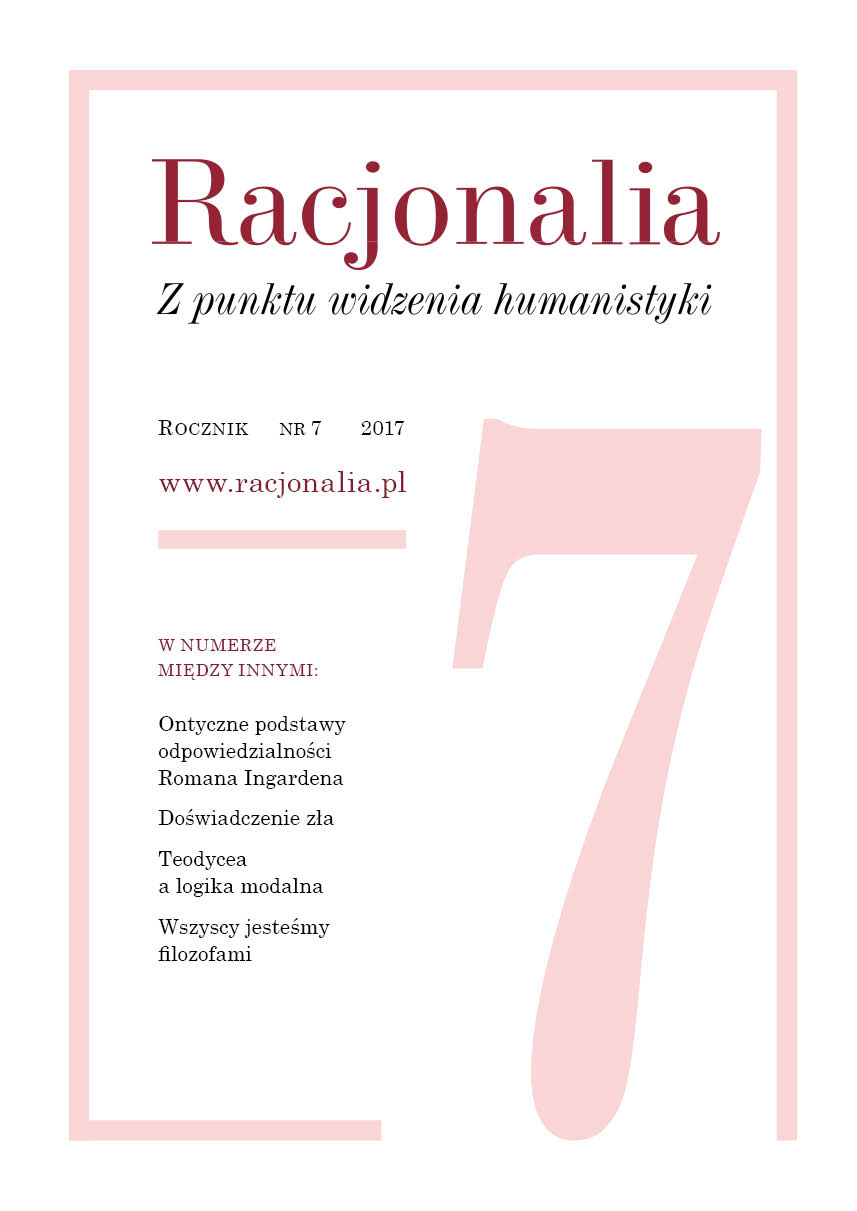In what sense evil justifies atheism?
DOI:
https://doi.org/10.15633/r.2441Keywords:
problem of evil, atheism, arguments from evil, religious experience, justification of atheismAbstract
In this paper, I critically analyse Jerome Gellman’s proposal that there exists a type of experience in which a subject experiences evil and perceives in this evil that there is no God. This a-religious experience gives prima facie support to the belief that there is no God. I show how accepting Gellman’s proposal allows us to go beyond the classical distinction between the intellectual and the emotional problem of evil. It also allows us to defend the rationality of some atheists, who do not believe in God because they experienced evil, but do not know the relevants arguments from evil. I suggest that there are two problems with Gellman’s account. The first is that there are no clear criteria of identifying a given experience of evil as the perception of God’s non-existence. The second problem concerns the scope of Gellman’s proposal. It is possible that some experiences of evil, which lead people to the belief that there is no God, do not count as perceptions that there is no God. In case of beliefs formed on the basis of such experiences, one must therefore look for another, non-perceptual grounds for justifying such beliefs.References
Adams S., Robson J., Does Absence Make Atheistic Belief Grow Stronger?, „International Journal for Philosophy of Religion” 79 (2016) no. 1.
Alston W., Perceiving God. The Epistemology of Religious Experience, London–Ithaca 1991.
Alston W., Précis of Perceiving God, „Philosophy and Phenomenological Research” 54 (1994) no. 4.
Craig W. L., Sinnott-Armstrong W., God? A Debate between a Christian and an Atheist, Oxford 2004.
Evans C. S., Natural Signs and Knowledge of God. A New Look at Theistic Arguments, Oxford 2010.
Gellman J., A New Look at the Problem of Evil, „Faith and Philosophy” 9 (1992) no. 2.
Hubaczek K., Bóg a zło. Problematyka teodycealna w filozofii analitycznej, Wrocław 2010.
Olczykowski D., Bąk J., Były więzień Auschwitz: chciałbym, żebyście to napisali, http://wiadomosci.onet.pl/tylko-w-onecie/karol-tendera-chcialbym-zebyscie-to-napisali-wywiad/nnrwm9 (28.08.2016).
Plantinga A., Warranted Christian Belief, Oxford 2000.
Schellenberg J., The Hiddenness Argument: Philosophy’s New Challenge to Belief in God, Oxford 2015.
Speak D., The Problem of Evil, Cambridge 2014.
Downloads
Published
Issue
Section
License
Twórca oświadcza, że służą mu prawa autorskie do utworu i że nie są ograniczone w zakresie objętym niniejszym oświadczeniem oraz że utwór jest dziełem oryginalnym i nie narusza praw autorskich innych osób.
Twórca zezwala Uniwersytetowi Papieskiemu Jana Pawła II w Krakowie na nieodpłatne, niewyłączne i nieograniczone w czasie korzystanie z utworu, to jest:
- utrwalanie i zwielokrotnianie: wytwarzanie egzemplarzy utworu techniką drukarską, reprograficzną, zapisu magnetycznego oraz techniką cyfrową;
- obrotu oryginałem albo egzemplarzami, na których utwór utrwalono (wprowadzanie do obrotu, użyczenie lub najem oryginału albo egzemplarzy, publiczne wystawienie, wyświetlenie, a także publiczne udostępnianie utworu w taki sposób, aby każdy mógł mieć do niego dostęp w miejscu i w czasie przez siebie wybranym);
- włączenie utworu w skład utworu zbiorowego;
- udzielanie przez Uniwersytet Papieski Jana Pawła II w Krakowie sublicencji Creative Commons Uznanie autorstwa-Użycie niekomercyjne-Bez utworów zależnych 3.0 Polska
Uniwersytet Papieski Jana Pawła II w Krakowie udostępnia utwór na Platformie Czasopism należącej do uczelni, na licencji Creative Commons Uznanie autorstwa-Użycie niekomercyjne-Bez utworów zależnych 3.0 Polska. Tym samym uprawnia wszystkich zainteresowanych do korzystania z utworu pod następującymi warunkami:
- zostanie podany autor i tytuł utworu,
- zostanie podane miejsce publikacji (tytuł czasopisma i adres internetowy do oryginalnie opublikowanego utworu),
- utwór będzie dystrybuowany w sposób niekomercyjny,
- nie będą tworzone utwory zależne.

